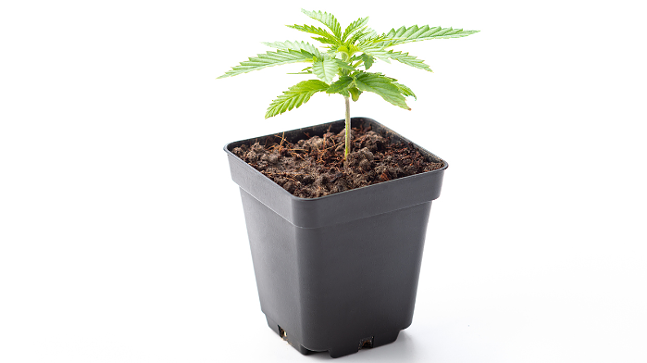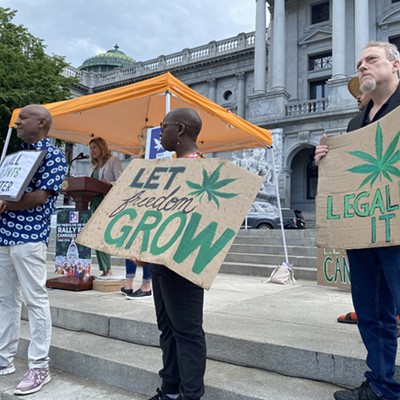Pa. lawmakers ready bipartisan home-grow bill for medical marijuana users
Two Pennsylvania lawmakers who already were leading the push for legalized recreational marijuana are expanding that crusade with a long-sought bill that would allow medical marijuana users to grow their own cannabis at home.
In a Thursday memo seeking co-sponsors for their proposal, Sens. Sharif Street (D-Philadelphia) and Dan Laughlin (R-Erie) will address disparities in cost and access to what is a life-saving medication for scores of the commonwealth’s residents. Medical marijuana has been legal in the state since 2016, the Capital-Star previously reported.
“The [Pennsylvania] Department of Health indicated that patients in some counties must travel more than two hours in order to reach a dispensary,” the two lawmakers wrote. “This is simply not feasible for many Pennsylvanians. In addition, patients have also been vocal on the fiscal challenges around the rising costs of medicine and affordability.”
In their co-sponsorship memo, Street and Laughlin say their bill would allow medical marijuana users to grow “a limited number of cannabis plants” for their personal use.
In a statement, Laughlin, citing data compiled by the Marijuana Policy Project, said that 15 of the 19 states that have legalized adult-use cannabis, and about half of the states that have legalized medical marijuana, have allowed for home cultivation.
Those states have enacted that Laughlin described as “reasonable safeguards,” including limiting the number of plants in each household, and requiring that they be secure and kept out of public view. And, in those instance, he added, “home cultivation of cannabis simply hasn’t been a problem. No state has repealed home cultivation, and there has never been a serious push to do so.
“It is critical that policy meet people where they are, and by allowing medical marijuana patients to grow cannabis plants at home, we can help ease the cost and accessibility burdens for this important medicine,” Laughlin, a likely 2022 Republican candidate for governor, said. “This legislation would go a long way towards helping everyday Pennsylvanians meet their health needs and ensuring everyone is treated equitably and fairly under [the state’s medical marijuana law.”
In February, Street and Laughlin first began seeking support for legislation legalizing adult-use recreational marijuana. The legislation is currently parked in the Senate Law & Justice Committee.
Last month, the Senate panel’s chairperson, Sen. Mike Regan (R-York) rolled out his own legalization bill. Regan’s proposal calls for using the proceeds from legalized cannabis to underwrite the Pennsylvania State Police and to fund community programs.
“For decades, marijuana has been used by adult residents in the state, but such use has financially benefited and perpetuated organized crime, gangs, and cartels,” Regan wrote in a memo asking colleagues for their support. “The street-level marijuana sold by these organizations is often laced with illicit drugs and toxic additives, and these criminals have been responsible for violence, mayhem, and murder across our state and country.”
While they overlap in some places, the two proposals differ in several ways, notably in matters of criminal justice reform.
The bill backed by Laughlin and Street would provide for the expungement of non-violent convictions for medical marijuana patients and those with non-violent marijuana convictions.
Civil rights advocates and criminal justice reform advocates have pushed for the language, pointing to racial and ethnic disparities in marijuana convictions, and the long-term damage that a minor conviction can inflict on someone’s economic and educational future.
Regan’s bill is silent on matters of criminal justice reform, and expungement, though the central Pennsylvania lawmaker does note that, as a former U.S Marshal, “I had the opportunity to work in federal law enforcement at the height of the drug war, so I know the seriousness of drug use.”
But, he added, “I am also cognizant that there has been a significant decline in arrests and prosecutions for personal use amounts of marijuana in recent years,” and that law enforcement’s time could be better spent “protecting our residents from the violent criminals and large-scale drug importers that are also dealing in heroin and fentanyl, which kill thousands of Pennsylvanians each year.”
In an email, Jeffrey Riedy, the executive director of the Lehigh Valley branch of pro-legalization group, NORML, welcomed Laughlin’s and Street’s home-grow bill.
“It is not at all surprising that Senators Street and Laughlin have chosen to tackle home cultivation for patients. Over the past year, we have been working with their offices on language for statewide legalization, and home cultivation has been a priority among advocates, as well as patients of the Medical Marijuana program,” Riedy wrote. “As a matter of fact, Senator Street made a failed attempt to add a home cultivation amendment to recent legislation (HB1024) that added provisions to Act 16.
“This new standalone legislation exemplifies Laughlin’s and Street’s commitment to repairing the injustices of prohibition, while readdressing the shortcomings of Act 16,” he continued. “Home cultivation for patients is one simple way to ease the burden for current patients financially, while ensuring access to safe, reliable medicines.”
John Micek is Editor-in-Chief of the Pennsylvania Capital-Star, where this story first appeared.
In a Thursday memo seeking co-sponsors for their proposal, Sens. Sharif Street (D-Philadelphia) and Dan Laughlin (R-Erie) will address disparities in cost and access to what is a life-saving medication for scores of the commonwealth’s residents. Medical marijuana has been legal in the state since 2016, the Capital-Star previously reported.
“The [Pennsylvania] Department of Health indicated that patients in some counties must travel more than two hours in order to reach a dispensary,” the two lawmakers wrote. “This is simply not feasible for many Pennsylvanians. In addition, patients have also been vocal on the fiscal challenges around the rising costs of medicine and affordability.”
In their co-sponsorship memo, Street and Laughlin say their bill would allow medical marijuana users to grow “a limited number of cannabis plants” for their personal use.
In a statement, Laughlin, citing data compiled by the Marijuana Policy Project, said that 15 of the 19 states that have legalized adult-use cannabis, and about half of the states that have legalized medical marijuana, have allowed for home cultivation.
Those states have enacted that Laughlin described as “reasonable safeguards,” including limiting the number of plants in each household, and requiring that they be secure and kept out of public view. And, in those instance, he added, “home cultivation of cannabis simply hasn’t been a problem. No state has repealed home cultivation, and there has never been a serious push to do so.
“It is critical that policy meet people where they are, and by allowing medical marijuana patients to grow cannabis plants at home, we can help ease the cost and accessibility burdens for this important medicine,” Laughlin, a likely 2022 Republican candidate for governor, said. “This legislation would go a long way towards helping everyday Pennsylvanians meet their health needs and ensuring everyone is treated equitably and fairly under [the state’s medical marijuana law.”
In February, Street and Laughlin first began seeking support for legislation legalizing adult-use recreational marijuana. The legislation is currently parked in the Senate Law & Justice Committee.
Last month, the Senate panel’s chairperson, Sen. Mike Regan (R-York) rolled out his own legalization bill. Regan’s proposal calls for using the proceeds from legalized cannabis to underwrite the Pennsylvania State Police and to fund community programs.
“For decades, marijuana has been used by adult residents in the state, but such use has financially benefited and perpetuated organized crime, gangs, and cartels,” Regan wrote in a memo asking colleagues for their support. “The street-level marijuana sold by these organizations is often laced with illicit drugs and toxic additives, and these criminals have been responsible for violence, mayhem, and murder across our state and country.”
While they overlap in some places, the two proposals differ in several ways, notably in matters of criminal justice reform.
The bill backed by Laughlin and Street would provide for the expungement of non-violent convictions for medical marijuana patients and those with non-violent marijuana convictions.
Civil rights advocates and criminal justice reform advocates have pushed for the language, pointing to racial and ethnic disparities in marijuana convictions, and the long-term damage that a minor conviction can inflict on someone’s economic and educational future.
Regan’s bill is silent on matters of criminal justice reform, and expungement, though the central Pennsylvania lawmaker does note that, as a former U.S Marshal, “I had the opportunity to work in federal law enforcement at the height of the drug war, so I know the seriousness of drug use.”
But, he added, “I am also cognizant that there has been a significant decline in arrests and prosecutions for personal use amounts of marijuana in recent years,” and that law enforcement’s time could be better spent “protecting our residents from the violent criminals and large-scale drug importers that are also dealing in heroin and fentanyl, which kill thousands of Pennsylvanians each year.”
In an email, Jeffrey Riedy, the executive director of the Lehigh Valley branch of pro-legalization group, NORML, welcomed Laughlin’s and Street’s home-grow bill.
“It is not at all surprising that Senators Street and Laughlin have chosen to tackle home cultivation for patients. Over the past year, we have been working with their offices on language for statewide legalization, and home cultivation has been a priority among advocates, as well as patients of the Medical Marijuana program,” Riedy wrote. “As a matter of fact, Senator Street made a failed attempt to add a home cultivation amendment to recent legislation (HB1024) that added provisions to Act 16.
“This new standalone legislation exemplifies Laughlin’s and Street’s commitment to repairing the injustices of prohibition, while readdressing the shortcomings of Act 16,” he continued. “Home cultivation for patients is one simple way to ease the burden for current patients financially, while ensuring access to safe, reliable medicines.”
John Micek is Editor-in-Chief of the Pennsylvania Capital-Star, where this story first appeared.



















